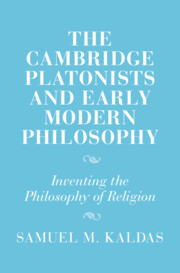Book contents
- The Cambridge Platonists and Early Modern Philosophy
- Cambridge Studies in Religion and Platonism
- The Cambridge Platonists and Early Modern Philosophy
- Copyright page
- Dedication
- Contents
- Acknowledgements
- Note on the Text
- Abbreviations
- Introduction: The Cambridge Platonists and Philosophy of Religion
- Part I The Origins of Cambridge Platonism
- 1 Learned and Ingenious Men
- 2 ‘Plato and His Scholars’:
- 3 Puritanism and Predestination
- 4 Cambridge Platonists versus Cambridge Calvinists:
- Part II Rival Conceptions of God and Goodness:
- Part III The Religious Epistemology of the Cambridge Platonists
- Conclusion: The Cambridge Platonists as Early Modern Christian Platonists
- References
- Index
1 - Learned and Ingenious Men
from Part I - The Origins of Cambridge Platonism
Published online by Cambridge University Press: 09 May 2024
- The Cambridge Platonists and Early Modern Philosophy
- Cambridge Studies in Religion and Platonism
- The Cambridge Platonists and Early Modern Philosophy
- Copyright page
- Dedication
- Contents
- Acknowledgements
- Note on the Text
- Abbreviations
- Introduction: The Cambridge Platonists and Philosophy of Religion
- Part I The Origins of Cambridge Platonism
- 1 Learned and Ingenious Men
- 2 ‘Plato and His Scholars’:
- 3 Puritanism and Predestination
- 4 Cambridge Platonists versus Cambridge Calvinists:
- Part II Rival Conceptions of God and Goodness:
- Part III The Religious Epistemology of the Cambridge Platonists
- Conclusion: The Cambridge Platonists as Early Modern Christian Platonists
- References
- Index
Summary
This chapter provides a basic introduction to Cambridge Platonism and its four central figures: Benjamin Whichcote (1609–83), Ralph Cudworth (1617–88), John Smith (c. 1618–52) and Henry More (c. 1614–87). Beginning with brief biographies of the Cambridge Platonists and an outline of the Civil War background to their intellectual development, the chapter then moves to a consideration of the contested nature of Cambridge Platonism in contemporary scholarship. Were Whichcote, More, Cudworth and Smith aligned enough biographically and intellectually to warrant grouping them together as architects of a shared philosophical school of thought? After reviewing several recent arguments to the contrary, the main argument of the book is laid out: Anthony Tuckney’s 1651 correspondence with Whichcote contains important evidence that Whichcote, Cudworth, Smith and More were known to their Cambridge contemporaries as proponents of a distinctive set of philosophical positions clearly inspired by Platonism.
Keywords
- Type
- Chapter
- Information
- The Cambridge Platonists and Early Modern PhilosophyInventing the Philosophy of Religion, pp. 9 - 29Publisher: Cambridge University PressPrint publication year: 2024

